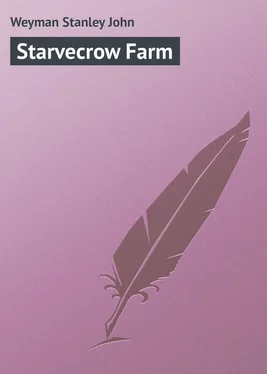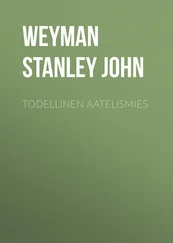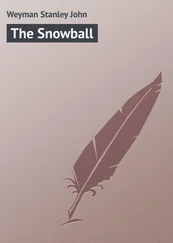Stanley Weyman - Starvecrow Farm
Здесь есть возможность читать онлайн «Stanley Weyman - Starvecrow Farm» — ознакомительный отрывок электронной книги совершенно бесплатно, а после прочтения отрывка купить полную версию. В некоторых случаях можно слушать аудио, скачать через торрент в формате fb2 и присутствует краткое содержание. Жанр: foreign_language, foreign_prose, на английском языке. Описание произведения, (предисловие) а так же отзывы посетителей доступны на портале библиотеки ЛибКат.
- Название:Starvecrow Farm
- Автор:
- Жанр:
- Год:неизвестен
- ISBN:нет данных
- Рейтинг книги:3 / 5. Голосов: 1
-
Избранное:Добавить в избранное
- Отзывы:
-
Ваша оценка:
- 60
- 1
- 2
- 3
- 4
- 5
Starvecrow Farm: краткое содержание, описание и аннотация
Предлагаем к чтению аннотацию, описание, краткое содержание или предисловие (зависит от того, что написал сам автор книги «Starvecrow Farm»). Если вы не нашли необходимую информацию о книге — напишите в комментариях, мы постараемся отыскать её.
Starvecrow Farm — читать онлайн ознакомительный отрывок
Ниже представлен текст книги, разбитый по страницам. Система сохранения места последней прочитанной страницы, позволяет с удобством читать онлайн бесплатно книгу «Starvecrow Farm», без необходимости каждый раз заново искать на чём Вы остановились. Поставьте закладку, и сможете в любой момент перейти на страницу, на которой закончили чтение.
Интервал:
Закладка:
"Will you leave me, please?" she said.
"I will," Mrs. Gilson answered gruffly. "But on one understanding, miss-and I'll have it plain. It must be all over. If you are satisfied he is a rascal-he has four children-well and good. But I'll have no goings on with such in my house, and no making two bites of a cherry! Here's a bit of paper I'll put on the table."
"I am satisfied," Henrietta whispered.
Under the woman's blunt words she shook as under blows.
But Mrs. Gilson seemed to pay little heed to her feelings.
"Very good, very good!" she answered. "But I'll leave the paper all the same. It's but a bit of a handbill that fool of a runner brought with him, but 'twill show you what kind of a poor thing your Joe was. Just a spouter, that got drunk on his own words and shot a poor inoffensive gentleman in a shop! Shame on him for a little dirty murder, if ever there was one."
"Oh, please go! please go!" Henrietta wailed.
"Very well. But there's the paper. And do you begin to think" – removing with housewifely hand a half-eaten dish of eggs from the table, and deftly poising on the same arm a large ham-"do you begin to think like a grown, sensible woman what you'd best do. The shortest folly's soonest over! That's my opinion."
And with that she opened the door, and, heavily laden, made her way downstairs.
The girl turned and stood looking at the room, and her face was wofully changed. It was white and pinched, and full of strained wonder, as if she asked herself if she were indeed herself, and if it could really be to her that this thing had happened. She looked older by years, she looked almost plain. But in her eyes was a latent fierceness. An observer might have guessed that her pride suffered more sharply than her heart. Possibly she had never loved the man with half the fervour with which she now hated him.
And that was true, though the change was sudden; ay, and though Henrietta did not know it, nor would have admitted it. She suffered notwithstanding, and horribly. For, besides pride, there were other things that lay wounded and bleeding: her happy-go-lucky nature that had trusted lightly, and would be slow to trust again; her girlish hopes and dreams; and the foolish fancy that had passed for love, and in a single day, an hour, a minute, might have become love. And one other thing-the bloom of her innocence. For though she had escaped, she had come too near the fire not to fear it henceforth, and bear with her the smell of singeing.
As she thought of that, of her peril and her narrow escape, and reflected how near she had come to utter shipwreck, her face lost its piteous look, and grew harder, and sharper, and sterner; so that the wealth of bright hair, that was her glory, crowned it only too brilliantly, only too youthfully. She saw how he had fooled her to the top of her bent; how he had played on her romantic tastes and her silly desire for secrecy. A low-born creature, an agitator, hiding from the consequences of a cowardly crime, he had happened upon her in his twilight walks, desired her-for an amusement, turned her head with inflated phrases, dazzled her inexperience with hints of the world and his greatness in it. And she-she had thought herself wiser than all about her, as she had thought him preferable to the legitimate lover assigned to her by her family. And she had brought herself to this! This was the end!
Or no, not the end. The game, for what it was worth, was over. But the candle-money remained to be paid. Goldsmith's stanzas had still their vogue; mothers quoted them to their daughters. Henrietta knew that when lovely woman stoops to folly, even to folly of a lighter dye-when she learns, though not too late, that men betray, there is a penalty to be paid. The world is censorious, was censorious then, and apt to draw from very small evidence a very dark inference. Henrietta's face, flaming suddenly from brow to neck, proved her vivid remembrance of this. Had she not called herself-the words burned her-"his wife in the sight of Heaven"? And now she must go back-if they would receive her-go back and face those whom she had left so lightly, face the lover whom she had flouted and betrayed, meet the smirks of the men and the sneers of the women, and the thoughts of both! Go back to blush before the servants, and hear from the lips of that grim prude, her sister-in-law, many things, both true and untrue!
The loss of the tender future, of the rosy anticipations in which she had lived for weeks as in a fairy palace-she could bear this! And the rough awakening from the maiden dream which she had taken for love-she must bear that too, though it left her world cold as the sheet of grey water before her, and repellent as the bald, rugged screes that frowned above it. She would bear the heartsickness, the loneliness, the pain that treachery inflicts on innocence; but the shame of the home-coming-if they would receive her, which she doubted-the coarse taunts and stinging innuendoes, the nods, the shrugs, the winks-these she could not face. Anything, anything were better, if anything she could find-deserted, flung aside, homeless as she was.
Meanwhile Mrs. Gilson, descending with a sour face, had come upon a couple of maids listening at the foot of the stairs. She had made sharp work of them, sending them packing with fleas in their ears. But they proved to be only the avant-couriers of scandal. Below were the Troutbeck apothecary and a dozen gossips, whom the news had brought over the hill; and hangers-on without number. All, however, had no better fate with Mrs. Gilson; not the parish constable of Bowness, whose staff went for little, nor even Mr. Bishop, that great man out of doors, at whose slightest nod ostlers ran and helpers bowed; he smiled superior, indeed, but he had the wisdom to withdraw. In two minutes, in truth, there remained of the buzzing crowd only the old curate of Troutbeck supping small beer with a toast in it. And he, it was said, knew better than any the length of the landlady's foot.
But this was merely to move the centre of ferment to the inn-yard. Here the news that the house had sheltered a man for whose capture the Government offered six hundred guineas, bred wild excitement. He had vanished, it was true, like a child of the mist. But he might be found again. Meantime the rustics gaped on the runner with saucer eyes, or flew hither and thither at his beck. And Radicals being at a discount in the Lowther country, and six hundred guineas a sum for which old Hinkson the miser would have bartered his soul, some spat on their hands and swore what they would do if they met the devil; while others, who were not apt at thinking, retired into corners and with knitted brows and hands plunged into breeches pockets conjured up a map of the world about Windermere.
It should be borne in mind that at this time police were unknown-outside London. There were parish constables; but where these were not cobblers, which was strangely often the case, they were men past work, appointed to save the rates. If a man's pocket were picked, therefore, or his stack fired, his daughter abducted, or his mare stolen, he had only himself and his friends to look to. He must follow the offender, confront him, seize him, carry him to the gaol. He must do all himself. Naturally, if he were a timid man or unpopular, the rogue went free; and sometimes went free again and again until he became the terror of the country-side. A fact which enables us to understand the terrors of lonely houses in those days, and explains the repugnance to life in solitary places which is traditional in some parts of England.
On the other hand, where the crime was known and outrageous, it became every man's business. It was every man's duty to join the hue and cry: if he did not take part in it he was a bad neighbour. Mr. Bishop, therefore, did not lack helpers. On the first discovery of Walterson's flight, which the officer had made a little after daybreak, he had sent horsemen to Whitehaven, Keswick, and Kendal, and a boat to Newby Bridge. The nearer shore and the woods on the point below the bishop's house-some called it Landoff House-were well beaten, and the alarm was given in Bowness on the one hand and in Ambleside on the other. The general voice had it that the man had got away early in the night to Whitehaven. But some stated that a pedlar had met him, on foot and alone, crossing the Kirkstone Pass at daybreak; and others, that he had been viewed skulking under a haystack near Troutbeck Bridge. That a beautiful girl, his companion, had been seized, and was under lock and key in the house, was whispered by some, but denied by more. Nevertheless, the report won its way, so that there were few moments when the chatterers who buzzed about the runner had not an eye on the upper windows and a voice ready to proclaim their discoveries.
Читать дальшеИнтервал:
Закладка:
Похожие книги на «Starvecrow Farm»
Представляем Вашему вниманию похожие книги на «Starvecrow Farm» списком для выбора. Мы отобрали схожую по названию и смыслу литературу в надежде предоставить читателям больше вариантов отыскать новые, интересные, ещё непрочитанные произведения.
Обсуждение, отзывы о книге «Starvecrow Farm» и просто собственные мнения читателей. Оставьте ваши комментарии, напишите, что Вы думаете о произведении, его смысле или главных героях. Укажите что конкретно понравилось, а что нет, и почему Вы так считаете.












